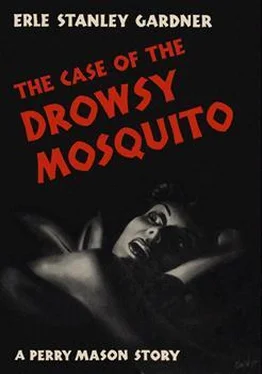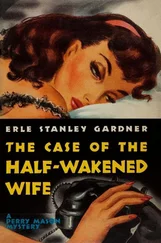Topham glanced speculatively at Small, almost imperceptibly nodded his head.
Small said, “You’re making all this up. You’re just talking.”
“But,” Mason went on, “the scheme went astray because that night Hayward Small didn’t go over and help himself to his usual evening cup of tea. The reason he didn’t was that he was planning to run away with Mrs. Sims’ daughter, and he knew that Mrs. Sims didn’t approve of him. He was somewhat afraid of her uncanny intuitive powers, her sharp tongue, and her shrewd eyes. So he kept on the outskirts, leaving Dorina to put the note under the sugar bowl. That upset Bradisson’s plans.
“Now, we can almost determine the exact time when that arsenic was placed in the sugar. It was placed in there after Della Street, Banning Clarke, Mrs. Sims and I had had our first cups of tea, because Mrs. Sims poured herself a fourth cup of tea, was the fourth to take sugar from the bowl — And she felt no ill effects. Then the persons who had been at that stockholders’ meeting entered the room. There was, of course, a certain amount of confusion with people passing back and forth around the table. Then Banning Clarke had a second cup of tea and put sugar in it. At that time he got the largest dose of poison, showing that the arsenic was at that time on top of the sugar, so that he got nearly all of it... Then, Della Street and I had a second cup, had sugar, and received a relatively small amount of arsenic. Now then, gentlemen, I submit that Bradisson was trying to poison Hayward Small, counting on Small’s habit of usually having a cup of tea when he entered the kitchen. Failing in his attempt at poison, Bradisson now tries to accomplish his end by making a highly confidential statement to the sheriff that he knows Hayward Small is guilty, and if the sheriff will get Small to trial on other evidence, Bradisson will be the surprise witness who sends him to the death cell.”
Mason stopped talking, apparently centering his attention entirely on the District Attorney, paying no more attention to Harvey Small than if Small had been a mere casual spectator.
“How does that sound, Mr. District Attorney?”
“It sounds very, very logical,” the District Attorney said.
Small blurted out, “The lawyer’s right. Damn Jim Bradisson for a double-crossing back-stabber. I should have known he’d try something like that. All right, damn him. Now I’ll do a little talking, and I’ll tell the truth.”
“That,” Mason said, “is very much better.”
Small said, “I knew Moffgat, used to hang around his office a bit. I dug up a little business for him. Nothing like an ambulance chaser, you understand, but just a friend of his who brought in business, and he did favors for me. I happened to be in his office one Friday morning. I’ll never forget the date — the fifth of December, nineteen hundred and forty-one. The reason I’ll never forget is that we all know what happened on December seventh. Well, I was waiting in the outer office to see Moffgat. Mrs. Banning Clarke was in the office with him. I’d never met her. Moffgat opened the door of the private office and looked out to see who was in the outer office. He saw me sitting there and asked if I’d mind stepping in and acting as witness to a will.”
“And you did so?”
“Yes.”
“And what happened subsequently?”
“You know.”
“You don’t know what was in that will?”
“No. I only know that along in January I read about Mrs. Clarke’s dying and about a will’s being offered for probate. I asked Moffgat if I didn’t have to testify as a witness to that will, and he acted so strangely about it I began to do a little thinking. I went and looked up the records. Well, it didn’t take me long to figure out what had happened when I saw that they were probating a will dated a year or so earlier and signed before two other witnesses. — I just climbed aboard the gravy train, that’s all. Nothing crude, you understand, but I made myself a broker of mining properties. Then I called on Bradisson, mentioned casually that I had known his sister, that I’d been a witness to a will she’d made very shortly before she died. That was all I needed to say. After that, when I suggested that the mining company should buy one of my properties at the price I put on it, the money was forthcoming. I didn’t run a willing horse to death, you understand, but I saw to it that my business was reasonably profitable.”
“Now,” Mason said to the District Attorney, “if we could locate the other witness to that will, we might find out something about Banning Clarke’s murder.”
Small said, “The other witness was named Craiglaw. He was waiting in the office at the same time I was. We happened to strike up an acquaintance. That’s all I know about him — that his name was Craiglaw, and that he was a man about fifty-four or fifty-five years old.”
Mason said to the District Attorney, “There is one phase of this matter that has never been explained. When Banning Clarke left the room immediately after drinking the poisoned cup of tea, Moffgat was trying to get me to stipulate to taking his deposition. Moffgat had a subpoena all ready to serve on him, and Moffgat said that he was going to serve that subpoena. It would have been logical for Moffgat to try to do so; yet apparently he made no such attempt. That would seem to indicate that he had other plans.
“At the time, I was just a little stupid. I underestimated Moffgat’s intelligence. I thought that he was dumb enough to let a witness he wanted slip through his fingers. But Moffgat wasn’t dumb — he was shrewd enough to know that if he flashed this subpoena on me, I would signal Banning Clarke to get out of the way. Then, Moffgat would have had an excellent excuse to go out in the cactus garden to try and serve his subpoena. If he had been caught there, he could simply have said, ‘Why, I’m here trying to serve this subpoena.’ But if he wasn’t caught there, if no one saw him enter, if he found Banning Clarke lying asleep on the sand, then he needed only to squeeze the trigger on an automatic and get off the premises. I notice that the sheriff checked on where everyone was at the time Dr. Kenward was wounded, but he didn’t check on Moffgat. Moffgat had announced he was driving back to Los Angeles, and for some reason, Sheriff Greggory took that entirely at its face value.
“A short time ago, Moffgat was trying very hard indeed to have the sale of the Shooting Star Group rescinded on the ground of fraud. More lately, he’s been talking about settling the case and keeping the claims. There’s just a chance that Moffgat spied on Banning Clarke when he was working on his wall. Or Moffgat may possibly have manipulated a beam of invisible light from a machine of his own. And if you turn a beam of invisible light on the lower part of that rock wall you’ll see what I mean — the low portion where even a man with heart trouble could manipulate the little rocks around.
“Evidently Banning Clarke was beginning to suspect something about what Moffgat had done, something of the true nature of Small’s hold over Bradisson. I wouldn’t doubt that Banning Clarke had some rather damaging bit of evidence which he was keeping in his desk. I do know that evidence had been tampered with. I found only a small phial and a dying mosquito. If Clarke had put that mosquito in the little bottle at the time he made the will, the insect would have been dead before I ever saw it.
“You know, Sheriff, if I were you, and if I had a brother-in-law in Los Angeles who is as clever and adroit as Lieutenant Tragg, I think I’d ring him up and suggest it would be a feather in both of your caps to apprehend Moffgat on a charge of first-degree murder, and whisk him out of Los Angeles County and up to San Roberto before he had a chance to start using any habeas corpus or taking steps to bring pressure to bear on the witnesses.”
Читать дальше












